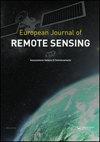基于重新拟合分割窗算法的FY3D MERSI-II地表温度反演
IF 3.7
4区 地球科学
Q2 REMOTE SENSING
引用次数: 2
摘要
中分辨率光谱成像仪II(MERSI-II)是风云三号(FY3D)卫星的核心传感器之一。两个相邻的250米长波热红外(TIR)通道为以高时空分辨率检索地表温度(LST)提供了相当大的机会。本文利用热力学初始猜测检索(TIGR)数据集和MODTRAN 4.0模型对适用于MERSI-II TIR通道的分割窗口(SW)算法的参数进行了重新拟合,然后检索出了日分辨率为250m的MERSI-II-LST产物。基于辐射(R-based)的方法结果表明,MODTRAN4.0模拟的LST与输入之间的偏差值为0.16K,MAE值为0.38K。相互比较的方法结果显示,MERSI-II LST和MODIS-LST产品在空间分布上是一致的,但在不同的土地覆盖类型下,MODIS LST和MERSI-II-LST之间存在一定的差异。基于T的方法结果表明,SW算法反演的现场观测LST和MERSI-II LST之间的R值超过0.92,偏差值在3.6K和4.4K之间,MAE值在2.6K和4.5K之间。上述结果表明,本研究提出的SW算法具有良好的准确性和适用性。本文章由计算机程序翻译,如有差异,请以英文原文为准。
Retrieval of land surface temperature from FY3D MERSI-II based on re-fitting Split Window Algorithm
ABSTRACT Medium Resolution Spectral Imager II (MERSI-II) is one of the core sensors mounted on the FengYun-3D (FY3D) satellite. Two adjacent 250 m long-wave thermal infrared (TIR) channels provide a considerable opportunity for retrieving Land Surface Temperature (LST) with high spatiotemporal resolution. In this paper, Thermodynamic Initial Guess Retrieval (TIGR) dataset and MODTRAN 4.0 model were used to re-fit the parameters of the Split-Window (SW) algorithm suitable for MERSI-II TIR channels, and then the daily 250 m resolution MERSI-II LST product was retrieved. The Radiance-based (R-based) method results showed that the bias value between simulated by MODTRAN4.0 and the input is 0.16 K, and the MAE value is 0.38 K. Inter-comparison method results showed that the MERSI-II LST and MODIS LST products were consistent in spatial distribution, but there were certain differences between MODIS LST and MERSI-II LST at different land cover types. T-based method results showed that R values between the site-observed LST and MERSI-II LST retrieved by SW algorithm exceeded 0.92, the bias value was between 3.6 K and 4.4 K, and the MAE value was between 2.6 K and 4.5 K. The above results indicating that the SW algorithm proposed in this study has good accuracy and applicability.
求助全文
通过发布文献求助,成功后即可免费获取论文全文。
去求助
来源期刊

European Journal of Remote Sensing
REMOTE SENSING-
CiteScore
7.00
自引率
2.50%
发文量
51
审稿时长
>12 weeks
期刊介绍:
European Journal of Remote Sensing publishes research papers and review articles related to the use of remote sensing technologies. The Journal welcomes submissions on all applications related to the use of active or passive remote sensing to terrestrial, oceanic, and atmospheric environments. The most common thematic areas covered by the Journal include:
-land use/land cover
-geology, earth and geoscience
-agriculture and forestry
-geography and landscape
-ecology and environmental science
-support to land management
-hydrology and water resources
-atmosphere and meteorology
-oceanography
-new sensor systems, missions and software/algorithms
-pre processing/calibration
-classifications
-time series/change analysis
-data integration/merging/fusion
-image processing and analysis
-modelling
European Journal of Remote Sensing is a fully open access journal. This means all submitted articles will, if accepted, be available for anyone to read anywhere, at any time, immediately on publication. There are no charges for submission to this journal.
 求助内容:
求助内容: 应助结果提醒方式:
应助结果提醒方式:


